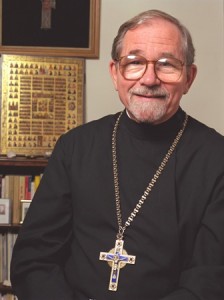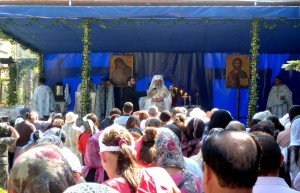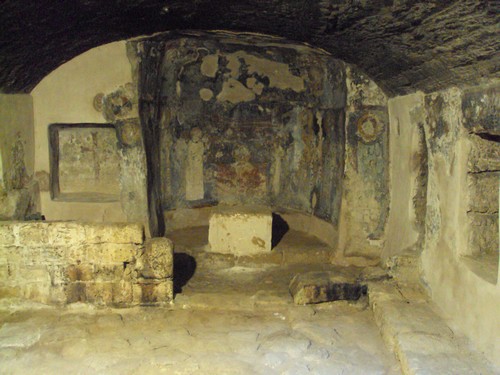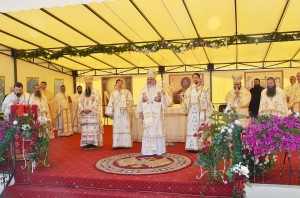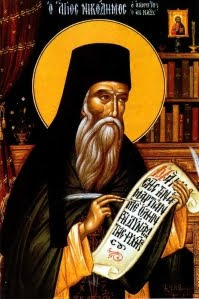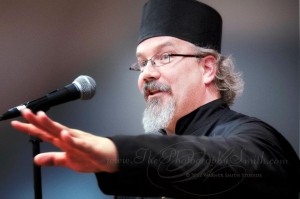 Last week, I spoke about the need for us to seek forgiveness for past hurts and for the transgressions that we might have committed. I used the image of the spare room where we keep all of those things that we do not want anyone to see. We stack them all up, one on top of the other, until they hit the ceiling and from wall to wall and there just is no more room. In this area is stored not only our transgressions but our hurts, our fears, our unfulfilled desires, we lock them away, and we try not to deal with them.
Last week, I spoke about the need for us to seek forgiveness for past hurts and for the transgressions that we might have committed. I used the image of the spare room where we keep all of those things that we do not want anyone to see. We stack them all up, one on top of the other, until they hit the ceiling and from wall to wall and there just is no more room. In this area is stored not only our transgressions but our hurts, our fears, our unfulfilled desires, we lock them away, and we try not to deal with them.
The problem is as we try and deepen our spiritual life that area stand there like a beacon urging us to open the door and start to clear out all of that clutter.
At the very center of our spiritual life is repentance, conversion, and the transformation of our thoughts and our life. For many of us, we spend time beating ourselves up when we fail, or we miss the mark in our spiritual life. But if we are working towards a truly authentic spiritual life, and I hope we all are, then we will not beat ourselves up instead we will confront them, head on, and reject them, confess them, and then try not to fall again. We must always remember that we are not our sins, our thoughts or our actions. People are not defined by what we do or say, we are defined by being children of God and loved by God because of the very fact the He created us. When we repent of all that we have done, we stop and renounce not only the actions that we are guilty of, but we also have to renounce the identity that goes along with it.
For many of us, we come to confession once or twice a year. Many of us sitting here today have not been to confession in many, many years! But when we come to the “annual” confession we are only dealing with that which lays on the surface our lives. Because we only come once or twice a year, we do not have the time to do the work that is necessary to get to the root of the problem.
As you know I have a rather large garden planted out back. Several times a week I spend time in the garden pulling weeds. I try as hard as I can to pull them up by the roots so they will not grow back. It would be easier for me just to trim off the part that sticks above the ground and leave the difficult part under the ground where no can see it. But soon or later that weed will come back. We pull those weeds because they take necessary nourishment away from the plants that produce the food that we need to sustain us. Our transgressions work the same way.
When you come to confession and say things like I am sorry I get angry, or sorry I am judgmental towards another person, that is fine, but you are only slipping off that which is above the soil of our soul. We need to go deep, much deeper than we have been willing to go before. What causes us to get angry and what is the reason we are so judgmental. The anger and judgment is a symptom, we can treat the symptom that is easy, but if we truly want to be cured of the illness that we need to get to the root of the problem.
As we place our hand on the door knob and begin to open that door to the secret place that we all have, we will come into contact with things that we have not spoken of ever or that we have not spoken of in many years. Even after we have confessed a certain thing we might be bothered by the thoughts or the feelings that the remembrance of what it was that we confessed. These thoughts and feelings might make us feel guilty and provoke our conscious to remind us that we have a broken relationship with God. We have to prepare ourselves of what breaks our relationship with God and with other people.
Metropolitan Kalistos Ware reminds us that there are no personal sins for all sin affects our brothers and sisters in Christ. Something like feeling anger towards one of the brethren and the evil that we might bear in our hearts toward them will have a damaging effect on the community. At the start of every Liturgy we pray, “In peace let us pray to the Lord.” We have to be at peace with all or we will be distracted in prayer. We have to fix that relationship not only with God but with the community as well.
One of the questions that I often hear asked about confession is why do I need to confess before a man when I can stand before God and confess? There are two answers, one you are not confessing to a man because two you are standing before God. It is not the priest who forgives, but God. Metropolitan Kalistos also says “every sin however secret is a stumbling block for others and makes it harder for them to serve Christ.” Confession, in the early Church, used to be done in public. People would rise, and confess what they had done and ask forgiveness from the entire community. As the Church grew this became a time for scandal for some and thus was born confession between the parishioner and the priest. Rather than standing before the community, the penitent stands before the priest and opens his/her heart under the conditions of secrecy.
When you come to confession here in the Church, you and I stand here before God. My role is to stand here and represent the community. By our confession before another human being we realize that we have sinned against the community and our sins have a social aspect to them. We seek not only forgiveness from God but from the community. We stand here and speak out loud what we have done, not only in breaking our relationship with God, but to our relationship with the community. God forgives you, and absolution is given not only as an assurance of that, but also to repair the damage that has been done in the community.
The confession that I am describing is a confession that cannot be done just once or even twice a year. If we are going to get serious about our spiritual lives then we have to be willing to put the work in that is necessary. Many of you spend time working out and watching what you eat. We do this so our bodies will be healthy. Perhaps we have been to the doctor, and he has told us that we need to shed a few pounds. Maybe we tried to put on last year’s pants and somehow them shrunk in the wash. We read labels and count calories, we run on the tread mill or we walk around the block. Whatever it is that we do we have to do it more than once or twice a year, or it is not going to work. The same is true with our spiritual life. We need to spend time on it. Once a week will just not do!
As I said before, there are reasons why we do what we do and that is what we need to get to. The reasons we do what we do are the things that we keep way in the back of the room under the pile at the bottom. Those are the things that we cannot see because we have piled up all of the symptoms in front of them. These are the things that might cause us pain, and so we do not want to remember them, we push them down, and we try to ignore them, and we become depressed and bitter.
As we progress through the spiritual life we have to confront this face to face, and we can only make this happen if we come and stand naked before God, and talk about what we need to talk about. We have to be willing to do the work that is necessary to get to the root of the problem. Just like in any physical activity, “no pain, no gain” is what we have to get to. But we cannot do this alone. We need someone who can lead us along this path, and point out where we need to go. But it all begins with confession and a willingness to change our lives.
Last week I mentioned that we were going to spend the next few weeks looking at how to deepen our spiritual life. No one, bishop, priest, or parishioner, can make this journey alone. We need a guide to help us along the path. That is my role, that is why I am here. The work of the Church is healing and purification of the people. The Church is where we come for healing of the passions so we might attain communion and unity with God. The Church is the hospital for the those who are sick with sin and the bishops and priests are the healers of the people of God.
It is the ministry of the priest, the spiritual father of the community, to help you along the journey to healing and a deeper spiritual life. There is such richness in our Orthodox Spiritual tradition that is ripe for the taking. We need to move past the surface and advance deeper and deeper below the surface to the roots of it all.
The work of the Church is therapeutic. The Church and her priests seek to heal the sickness of the soul which torments all of us. The tools are available, and we all need someone to show us how to use those tools.
The time has come for us to begin that work that is necessary to deepen our spiritual life. On Wednesday we begin the fast period leading up to the great Feast of the Dormition of the Theotokos. The fast periods of the Church are designed to be penitential and ideal times to return to confession, the ideal time to begin the work required to get to the roots. Let us not allow that time pass. Do not squander the opportunity you are being given to deepen your relationship with the God who created you.
The time is now, what are you waiting for?

